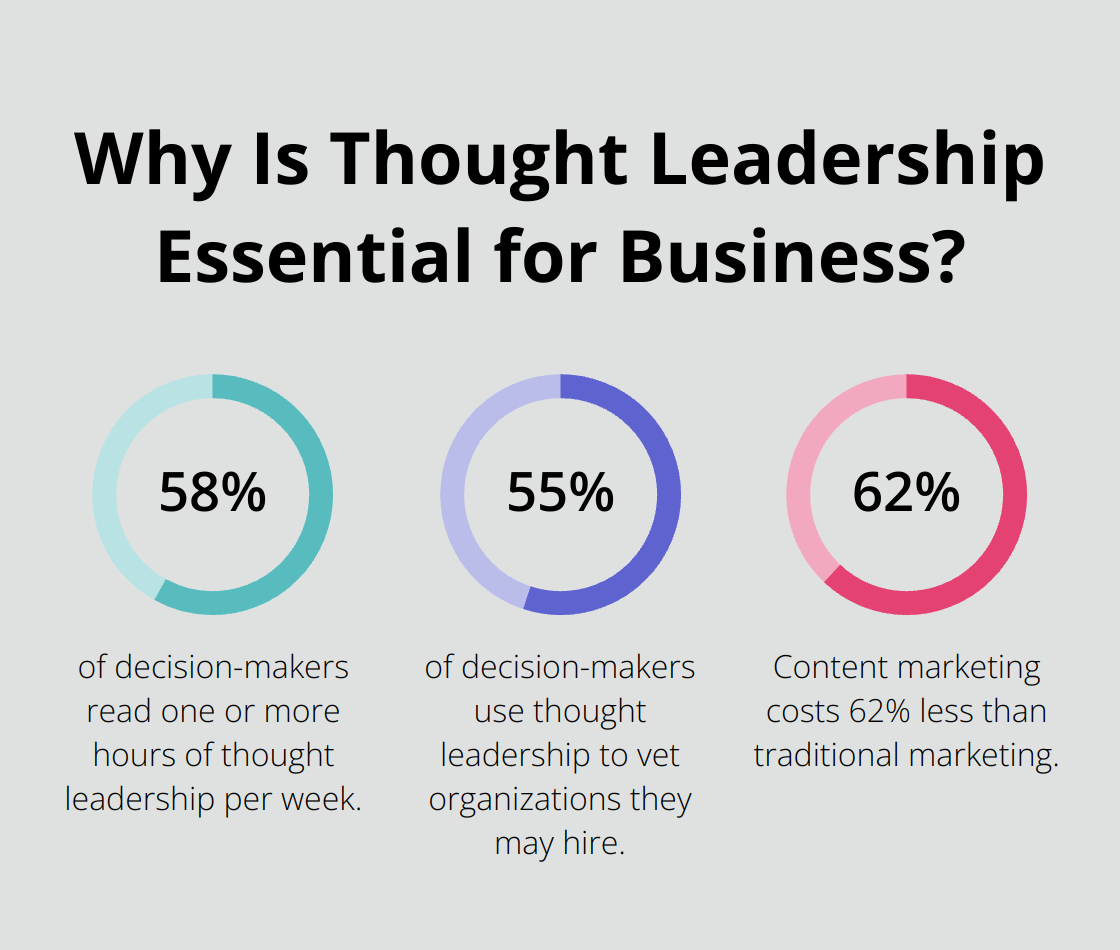Content marketing has been hailed as king in the digital realm for years. But does this crown still fit today?
At Made Simpler, we’ve seen firsthand how content marketing strategies have shifted and adapted. This post explores whether content marketing still reigns supreme and what the future holds for this powerful digital tool.
How Content Marketing Has Evolved
Content marketing has undergone a significant transformation since its inception. What began as simple product catalogs and company newsletters has morphed into a sophisticated, multi-channel strategy essential for businesses of all sizes.
The Digital Revolution
The late 1990s and early 2000s marked a turning point for content marketing with the rise of digital platforms. Businesses discovered new avenues to reach their audiences. Blogs gained popularity, allowing companies to showcase their expertise and build customer relationships. Social media platforms (like Facebook and Twitter) emerged, offering direct communication lines with audiences.
Content Diversification
As technology advanced, the types of content businesses could create expanded. Video content exploded in popularity with YouTube’s launch in 2005. Podcasts gained traction, offering a new audio medium for content consumption. Infographics became a powerful tool for visualizing complex information.
The Mobile Era
The widespread adoption of smartphones further revolutionized content marketing. Content needed to be mobile-friendly and easily consumable on smaller screens. This shift led to the rise of micro-content – short, snackable pieces of information that users could quickly digest on the go.
Current Trends and Future Outlook
Today, content marketing is more sophisticated than ever. Personalization is key, with businesses using data and AI to tailor content to individual preferences. Interactive content (such as quizzes and polls) is gaining popularity for its ability to actively engage audiences.
AI will likely play an even bigger role in content creation and distribution in the future. These innovations are changing traditional distribution methods and allowing for new approaches to content marketing.

Virtual and augmented reality are also poised to transform content marketing, offering immersive experiences that were once the stuff of science fiction.
As we move forward, the businesses that adapt and innovate will stay ahead of the curve. The next section will explore the key benefits that make content marketing a cornerstone of modern digital strategies.
Why Content Marketing Delivers Results
Boosting Brand Visibility and Credibility
Content marketing proves itself as a powerhouse for increasing brand awareness and building trust with audiences. The Content Marketing Institute reports that content marketing is driving increased engagement levels and other relevant stats. Businesses that consistently produce valuable, relevant content position themselves as industry experts and go-to resources for their target audience.
Fueling Organic Growth and Lead Generation
Content marketing excels at driving organic traffic and generating high-quality leads. HubSpot’s research shows that companies that published 16+ blog posts per month got almost 3.5X more inbound traffic than companies that published fewer posts. This increased traffic directly translates into more lead generation opportunities.

To maximize content’s impact on lead generation, create targeted, problem-solving content that addresses your audience’s pain points. Include clear calls-to-action (CTAs) and lead magnets (such as e-books or webinars) to capture visitor information.
Establishing Industry Authority
Content marketing stands out as an unparalleled tool for establishing thought leadership and industry authority. Sharing unique insights, original research, and expert opinions positions businesses at the forefront of their industry.
A study by Edelman and LinkedIn found that 58% of decision-makers read one or more hours of thought leadership per week. Moreover, 55% use thought leadership to vet organizations they may hire. These statistics underscore the importance of producing high-quality, authoritative content that showcases expertise.
Cost-Effective Marketing Strategy
Compared to traditional marketing methods, content marketing offers a significantly higher return on investment (ROI). DemandMetric reports that content marketing costs 62% less than traditional marketing and generates about 3 times as many leads.
The long-term value of content marketing stands out particularly. While paid advertising stops generating results the moment you stop paying, well-crafted content continues to attract and engage audiences long after its initial publication. This compounding effect makes content marketing an increasingly cost-effective strategy over time.
As we explore the undeniable benefits of content marketing, it’s important to acknowledge that this powerful strategy also comes with its own set of challenges. In the next section, we’ll examine the obstacles that marketers face when implementing content marketing strategies and how to overcome them.
Navigating Content Marketing Hurdles
The Challenge of Standing Out
The digital space overflows with content. 62.96% of bloggers publish the majority of their original content as blog posts. This saturation makes it increasingly difficult to capture and retain audience attention.

To combat this, content creators must focus on unique, high-value content. Original research, exclusive insights, or innovative formats can help. Quality trumps quantity when it comes to resonating with target audiences.
Measuring Return on Investment
Proving the return on investment (ROI) of content marketing presents a challenge. Unlike paid advertising with immediate, trackable results, content marketing’s impact often takes time to materialize and can be more diffuse.
To address this, marketers should set clear, measurable goals from the outset. Tools like Google Analytics help track key performance indicators (KPIs) such as traffic, engagement rates, and conversions. The Content Marketing Institute reports that 80% of B2B content marketers use metrics to measure content performance. It’s important to tie content efforts to business outcomes like lead generation and sales, rather than focusing solely on vanity metrics.
Adapting to Algorithm Changes
Search engines and social media platforms frequently update their algorithms, which can significantly impact content visibility and reach. Google has made numerous changes to its search algorithm over the years.
To stay ahead, content marketers should diversify their distribution channels. Relying solely on organic search or a single social media platform can be risky. Building a strong email list remains one of the most effective channels.
Regular audits of content performance allow for necessary strategy pivots. Staying informed about industry news and algorithm updates helps anticipate changes and adjust approaches proactively.
Balancing Quality and Quantity
Content marketers often struggle to find the right balance between producing high-quality content and maintaining a consistent publishing schedule. The pressure to constantly create new content can sometimes lead to a decrease in quality.
To address this, content creators should develop a sustainable content calendar that allows for thorough research and thoughtful creation. Repurposing existing content (e.g., turning a blog post into an infographic or video) can help maintain a steady stream of content without sacrificing quality.
Keeping Up with Technological Advancements
The rapid pace of technological change presents another challenge for content marketers. New platforms, formats, and tools emerge constantly, requiring continuous learning and adaptation.
Content creators must stay informed about emerging technologies and assess their potential impact on content strategies. This might involve experimenting with new formats (like virtual reality or augmented reality content) or leveraging AI tools for content creation and optimization.
Final Thoughts
Content marketing remains king in the digital realm, despite challenges like content saturation and algorithm changes. Its benefits, from building brand awareness to establishing thought leadership, continue to outweigh the hurdles. Emerging technologies such as AI and virtual reality will reshape the content landscape, offering new possibilities for personalized and immersive experiences.

Businesses must innovate while staying true to the core principles of valuable, audience-focused content. This involves adapting to new platforms, leveraging data analytics, and prioritizing quality over quantity. Continuous learning and experimentation with new formats will help content marketers stay ahead in this dynamic field.
At Made Simpler, we offer content marketing solutions designed to elevate your strategy. Our services (including SEO-optimized blog content and podcast production) aim to deliver significant returns on investment. We invite you to explore how we can help you harness the power of content marketing in today’s digital world.

